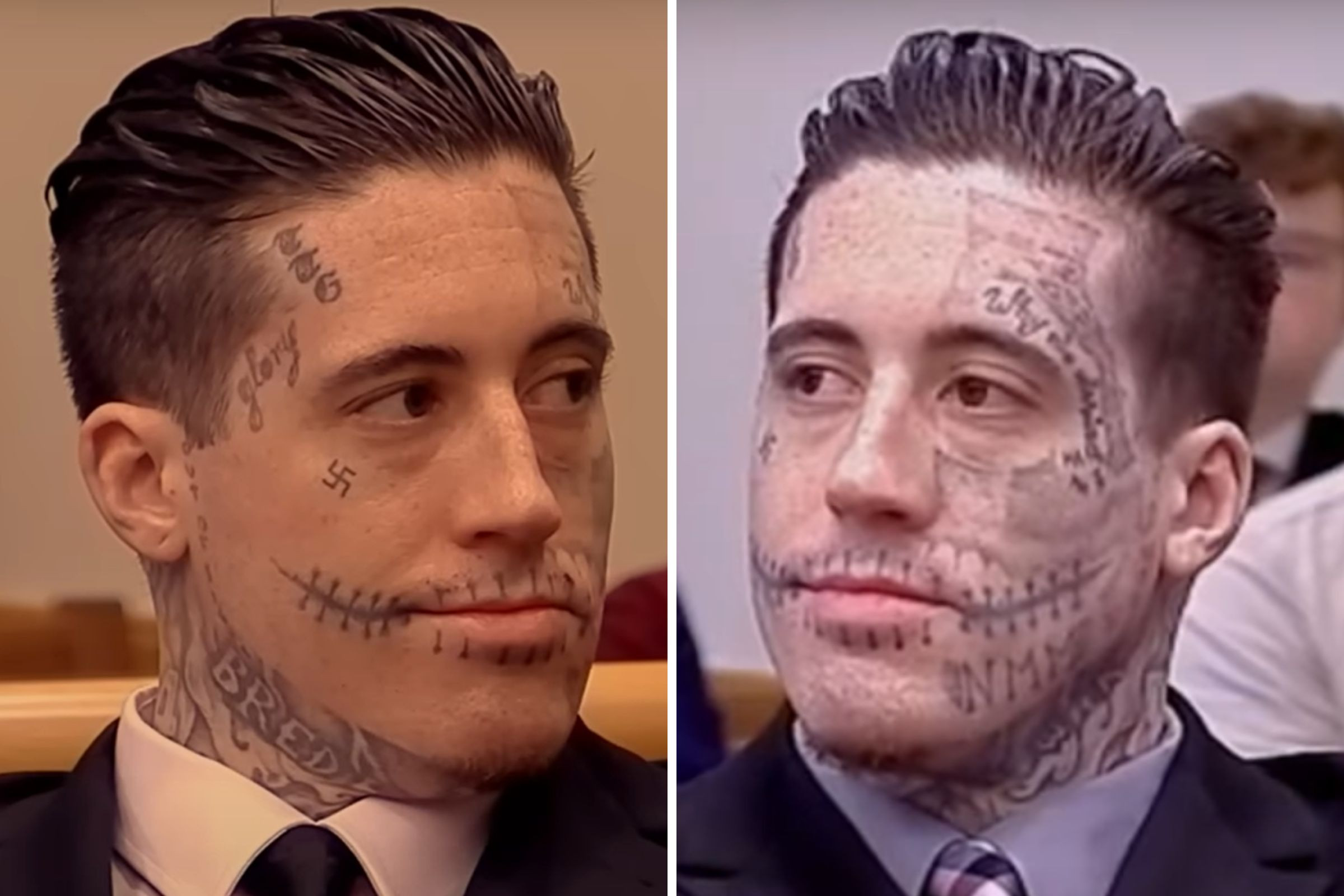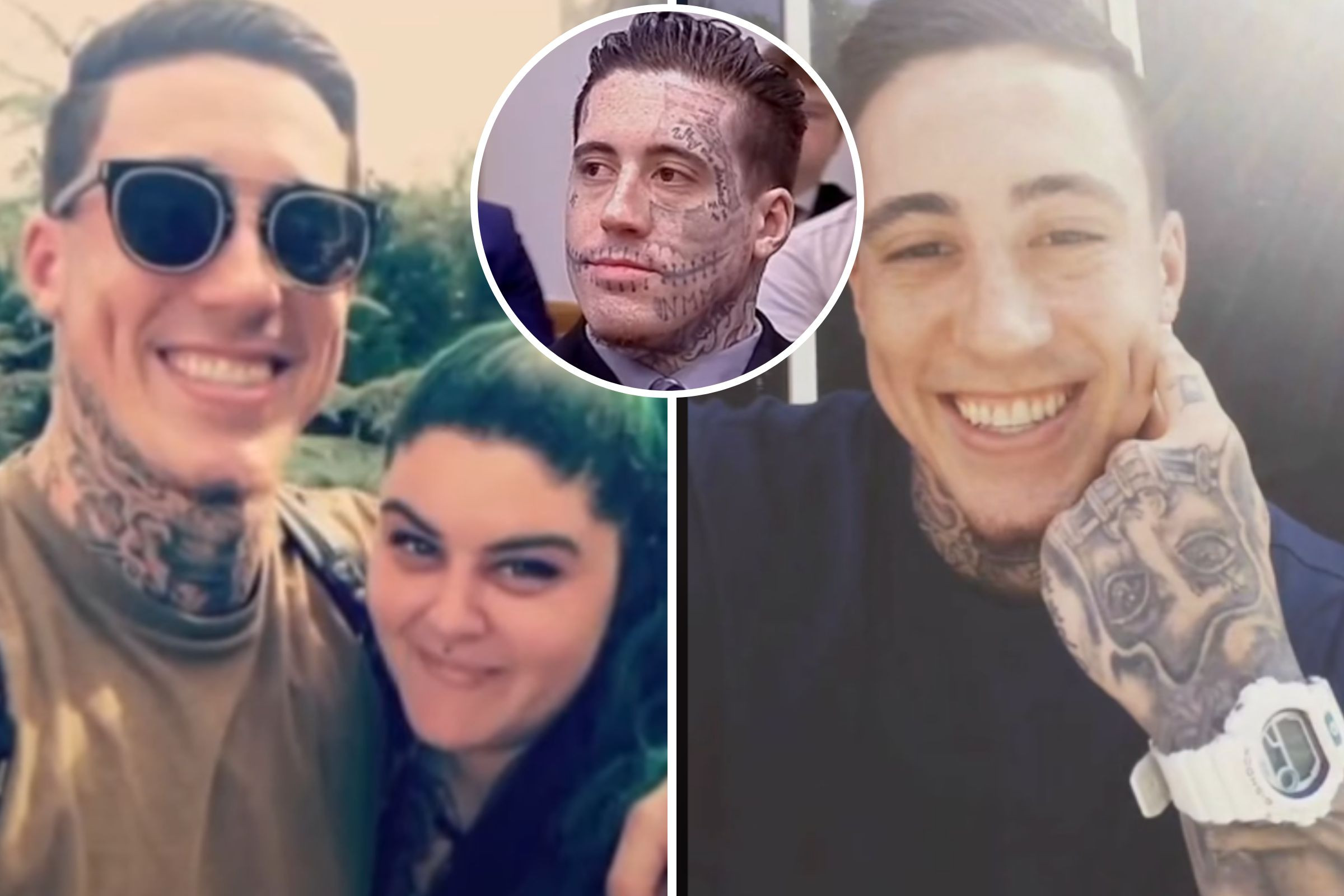Are you curious about why someone would choose to tattoo their face, especially with controversial imagery? Wade Wilson’s facial tattoos have sparked widespread interest and debate. Join us on tattooat.com as we delve into the possible motivations behind Wade Wilson’s face tattoos, exploring the symbolism and potential psychological factors at play. Discover the meaning behind his ink and the impact it had on his trial.
1. What is the Significance of Wade Wilson’s Face Tattoos?
Wade Wilson’s face tattoos are symbols that reflect his beliefs and potentially influenced his trial. According to Anti-Defamation League Research Fellow Christopher Magyarics, tattoos like the number 14, the number 88, and swastikas indicate white supremacist beliefs. The “Why so serious?” tattoo is a reference to the Joker from “The Dark Knight”. His tattoos have sparked interest and debate.
1.1 What are the white supremacist tattoos?
The number 14 on his neck refers to the “14 words” white supremacist mantra: “We must secure the existence of our people and a future for white children.” The number 88, also on his neck, is a numeric code for “Heil Hitler.” The combination of 1488 is commonly used by white supremacists. Two swastika tattoos, one on his scalp and another under his right eye, are symbols of Nazi Germany and Adolf Hitler.
1.2 What are the other tattoos and their meaning?
Other tattoos include “TTG” on his forehead, allegedly standing for “Time To Go” or “Trained To Go,” indicating readiness to fight. “Bred for war” is tattooed under his chin, also suggesting a combative stance. “NMM” on his left jaw might refer to Deadpool’s Wade Wilson. Around his left eye, the words “Why so serious?” are tattooed, referencing the Joker from “The Dark Knight,” with “Ha ha ha” underneath, and a stitched-on smile around his mouth.
 Wade Wilson murder tattoos
Wade Wilson murder tattoos
1.3 What did the tattoos mean in the court room?
Richard Gabriel, president of Decision Analysis, Inc., explained that Wilson’s appearance could have influenced the jury. He stated that jurors evaluate whether a defendant looks like the kind of person who would commit the crime. Menacing tattoos and swastikas would likely have an impact on jurors, potentially prejudicing their decision-making. The defense team’s request to cover the tattoos highlights their concern about this potential bias.
2. When Did Wade Wilson Get His Face Tattoos?
Wade Wilson acquired his face tattoos after his arrest in October 2019, while in custody awaiting trial. According to court documents and reports from Newsweek, his appearance changed significantly during this period. This timing is crucial because it raises questions about the motivations behind getting the tattoos and their potential impact on his legal proceedings.
2.1 Why did he get tattoos after his arrest?
The reasons behind Wilson’s decision to get face tattoos after his arrest remain unclear. His defense attorney, Kevin Shirley, mentioned that Wilson created his appearance while in custody but never expressed his reasons. It’s possible that the tattoos were a form of self-expression, an attempt to align himself with certain ideologies, or a deliberate strategy to influence the perception of the jury.
2.2 How did the court react to the tattoos?
Recognizing the potential impact of the tattoos on the jury, Wilson’s legal team sought permission to cover them up during the trial. In May, the judge granted their motion to allow him to get a haircut and cover some tattoos with makeup. However, according to Kevin Shirley, the makeup provided was insufficient to fully conceal the tattoos.
3. Could Wade Wilson’s Tattoos Have Influenced The Jury?
Wade Wilson’s tattoos could have had a subliminal impact on the jury. Richard Gabriel from Decision Analysis, Inc., noted that jurors often evaluate defendants based on their appearance, assessing whether they “look like the kind of person that would have committed the accused crime.” The menacing nature of Wilson’s tattoos, combined with the presence of swastikas, could have influenced the jury’s perception.
3.1 How can tattoos impact a jury?
Tattoos, especially those with hateful symbolism, can create a strong impression on jurors. They might perceive the defendant as dangerous, hateful, or unrepentant. This perception can subconsciously influence their judgment, making them more likely to believe the defendant is guilty. The potential for prejudice is why defense teams often try to minimize the visibility of such tattoos.
3.2 What did the defense try to do about the tattoos?
Wilson’s defense team recognized the potential for prejudice and attempted to mitigate its impact. They successfully argued for a procedure to cover up the tattoos with makeup. When the makeup proved insufficient, his attorney attempted to argue that the tattoos demonstrated his mental instability, hoping to sway the jury’s perception.
4. Who is Wade Wilson?
Wade Wilson is a convicted murderer from Florida. He gained notoriety for the racist tattoos covering his face, neck, and hands. Wilson was convicted of the brutal murders of Kristine Melton and Diane Ruiz in October 2019. He faced the possibility of the death penalty or life in prison. His case garnered significant media attention due to the horrific nature of his crimes and his disturbing appearance.
4.1 What were his crimes?
Wade Wilson was found guilty of murdering Kristine Melton and Diane Ruiz in October 2019. The crimes were described as brutal, leading to significant public outrage. The details of the murders contributed to the intense scrutiny of Wilson and his case.
4.2 What was his sentence?
Following his conviction, Wade Wilson faced sentencing for the murders of Melton and Ruiz. The prosecution sought the death penalty, while the defense argued for life in prison. Ultimately, he was sentenced, adding another chapter to this disturbing case.
5. What is the Connection Between Wade Wilson and Deadpool?
The connection between Wade Wilson and Deadpool is purely coincidental. One of Wade Wilson’s tattoos, “NMM” on his left jaw, is speculated to be a reference to the Deadpool character Wade Wilson, who gets that tattoo to remember M-day. However, this interpretation is uncertain.
5.1 Is there a deeper connection between him and the Deadpool character?
Despite the tattoo speculation, there is no deeper connection between Wade Wilson, the convicted murderer, and the Deadpool character. The similarity in names is purely coincidental. The tattoo might simply reflect Wilson’s interest in the comic book character or a dark sense of humor.
5.2 What are the cultural references in his tattoos?
Wilson’s tattoos incorporate several cultural references, reflecting a complex and disturbing mindset. The “Why so serious?” tattoo references the Joker from “The Dark Knight,” while the “NMM” tattoo might reference Deadpool. These references, combined with white supremacist symbols, paint a disturbing picture of his beliefs and interests.
6. What Role Did Ex-Girlfriend Kelly Matthews Play in the Wade Wilson Case?
Kelly Matthews, Wade Wilson’s ex-girlfriend, played a role in the case by sharing her experiences dating him. She posted TikTok videos and spoke to Newsweek about their relationship, providing insights into Wilson’s behavior and demeanor before he got his face tattoos.
6.1 What did she say about him?
Matthews described Wilson as “charismatic and smart” when they first met online in 2018. She shared photos of him from that time, showing him smiling and without any face tattoos. However, she noted that his behavior began to change when he started using cocaine. She recounted an incident where he became violent after she tried to search his bag for drugs.
6.2 How did she feel about the trial?
Matthews expressed that hearing about Wilson’s crimes against Kristine Melton brought back painful memories of her own experiences. She recounted an incident where Wilson allegedly tied her up and drove through a McDonald’s while she was in the back of the car. Her testimony provided additional context to Wilson’s character and behavior, highlighting a pattern of violence and abuse.
 Wade Wilson and ex-girlfriend Matthews
Wade Wilson and ex-girlfriend Matthews
7. What are the Legal Implications of Racist Tattoos in Court Cases?
Racist tattoos in court cases raise complex legal implications. The primary concern is whether the tattoos unduly prejudice the jury, potentially violating the defendant’s right to a fair trial. Courts must balance the defendant’s right to self-expression with the need to ensure an impartial jury.
7.1 Can tattoos lead to a mistrial?
Tattoos can potentially lead to a mistrial if they are deemed so prejudicial that they prevent the jury from rendering a fair verdict. The defense can argue that the tattoos create an atmosphere of bias, making it impossible for the defendant to receive impartial consideration. The judge must then decide whether the prejudice is severe enough to warrant a mistrial.
7.2 How do courts handle visible tattoos during trials?
Courts employ various strategies to manage visible tattoos during trials. These include allowing the defendant to cover the tattoos with makeup or clothing, instructing the jury to disregard the tattoos, and carefully screening potential jurors to identify and exclude those who might be biased. The specific approach depends on the nature of the tattoos and the circumstances of the case.
8. What is the Impact of Media Coverage on Cases Involving Controversial Tattoos?
Media coverage can significantly impact cases involving controversial tattoos. Sensational reporting and graphic images can amplify public outrage and potentially influence the jury pool. It is essential for media outlets to report responsibly, avoiding sensationalism and focusing on the facts of the case.
8.1 How can media coverage influence public opinion?
Media coverage shapes public opinion by framing the narrative and highlighting certain aspects of the case. If the media focuses heavily on the defendant’s tattoos, it can create a negative perception and make it more difficult for the defendant to receive a fair trial. Balanced and objective reporting is crucial to mitigating this risk.
8.2 What ethical considerations should media outlets consider?
Media outlets should consider several ethical considerations when covering cases involving controversial tattoos. They should avoid using inflammatory language, sensationalizing the story, and publishing images that are unduly prejudicial. They should also provide context and background information to ensure that the public understands the complexities of the case.
9. What are Some Other Examples of Tattoos Influencing Court Cases?
Several other court cases have involved tattoos influencing legal proceedings. These examples illustrate the challenges and complexities of balancing freedom of expression with the need for a fair trial. The specific outcomes vary depending on the nature of the tattoos and the circumstances of the case.
9.1 Cases where tattoos were deemed prejudicial
In some cases, tattoos have been deemed so prejudicial that they influenced the outcome of the trial. For example, tattoos associated with hate groups or criminal organizations can create a strong negative impression on the jury. In such cases, courts may take steps to minimize the visibility of the tattoos or provide cautionary instructions to the jury.
9.2 Cases where tattoos were not considered prejudicial
In other cases, tattoos have not been considered prejudicial. This might occur if the tattoos are not overtly offensive or if the court believes that the jury can remain impartial despite their presence. The specific facts and circumstances of each case determine whether the tattoos are deemed prejudicial.
10. What Psychological Factors Might Explain Why Someone Gets Extremist Tattoos?
Several psychological factors might explain why someone gets extremist tattoos. These factors include a desire for belonging, a need for self-expression, and the influence of extremist ideologies. Tattoos can serve as a powerful symbol of identity and affiliation, reinforcing an individual’s commitment to a particular group or cause.
10.1 The role of identity and belonging
For individuals drawn to extremist ideologies, tattoos can provide a sense of identity and belonging. By permanently marking their bodies with symbols of their beliefs, they signal their commitment to the group and strengthen their bonds with other members. Tattoos can also serve as a form of rebellion or defiance, expressing anger or resentment towards mainstream society. According to research from Portland State University’s Art Department, in July 2025, belonging provides a sense of security for the extremist.
10.2 The influence of group dynamics
Group dynamics play a significant role in the decision to get extremist tattoos. Individuals may feel pressure to conform to group norms or to prove their loyalty to the cause. Tattoos can serve as a rite of passage, marking an individual’s acceptance into the group and solidifying their commitment to its values.
Navigating the world of tattoos can be both exciting and overwhelming. Whether you’re seeking inspiration, looking for a talented artist, or trying to understand the complexities of tattoo culture, tattooat.com is here to help.
Dive into a world of ink and artistry with tattooat.com!
- Discover Unique Designs: Explore a vast gallery of tattoo designs, from traditional motifs to cutting-edge styles.
- Find Your Perfect Artist: Connect with skilled and experienced tattoo artists in the United States.
- Learn Essential Tattoo Knowledge: Access in-depth articles and guides on tattoo aftercare, safety, and the latest trends.
Ready to start your tattoo journey? Visit tattooat.com today!
(Address: 1825 SW Broadway, Portland, OR 97201, United States. Phone: +1 (503) 725-3000. Website: tattooat.com)
FAQ About Wade Wilson’s Face Tattoos
1. Why did Wade Wilson get face tattoos?
Wade Wilson got face tattoos for a few reasons including self-expression, white supremacist beliefs, and/or mental instability.
2. What do Wade Wilson’s tattoos mean?
Some of Wade Wilson’s tattoos, such as the number 14, the number 88, and swastikas, indicate white supremacist beliefs.
3. Did Wade Wilson have tattoos before his arrest?
No, Wade Wilson did not have face tattoos before his arrest. He acquired them while in custody awaiting trial.
4. Did the court allow Wade Wilson to cover his tattoos?
Yes, the court granted Wade Wilson’s legal team’s motion to allow him to get a haircut and cover some of his tattoos with makeup for his trial.
5. Did Wade Wilson’s tattoos influence the jury?
Wade Wilson’s tattoos likely influenced the jury, as they could have perceived him as dangerous and hateful, potentially prejudicing their decision.
6. What is the connection between Wade Wilson and Deadpool?
The connection between Wade Wilson and Deadpool is a tattoo on his left jaw which is speculated to be a reference to the Deadpool character Wade Wilson.
7. What did Wade Wilson’s ex-girlfriend say about his tattoos?
Wade Wilson’s ex-girlfriend has photos of him from that time, showing him smiling and without any face tattoos.
8. What are the legal implications of racist tattoos in court cases?
The legal implications of racist tattoos in court cases are the potential for prejudice and the need to ensure the defendant’s right to a fair trial.
9. How can tattoos influence public opinion?
The media focuses heavily on the defendant’s tattoos, it can create a negative perception and make it more difficult for the defendant to receive a fair trial.
10. What are some examples of tattoos influencing court cases?
Tattoos are prejudicial in court cases if they are associated with hate groups or criminal organizations can create a strong negative impression on the jury.
